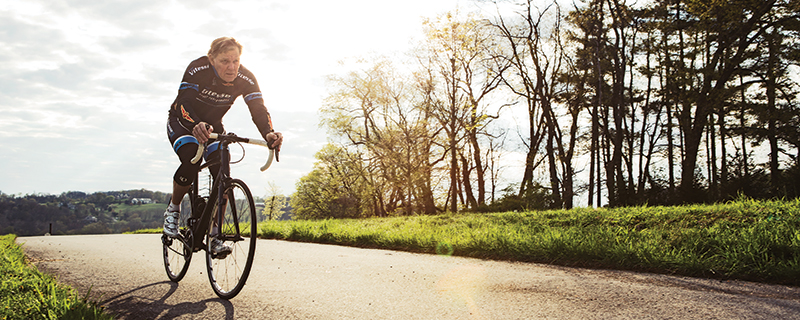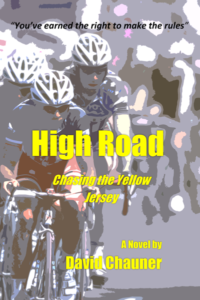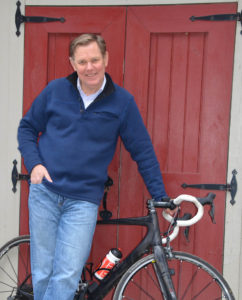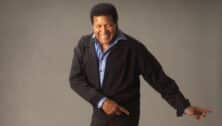VISTA Authors: A Review of David Chauner’s ‘High Road: Chasing The Yellow Jersey’

Often novels are composed as long love letters. Readers open the book, unsealing a missive addressed to a person, place or an era. Fitzgerald famously addressed The Great Gatsby to Zelda, which, owes as much to her as to the decadence of the 1920’s. Faulkner wrote to his mythic Mississippi. Hemingway: Spain or Paris, and his wars.
Fertile ground too, for this kind of long, one-sided romance writing is the world of sport. Don Delillo, Philip Roth, and many others have crafted stories within strange worlds of organized competition. The old man’s love for the child’s game.
 And now there’s David Chauner’s “High Road: Chasing the Yellow Jersey”, a steamy, pulpy love letter to international cycling and the Tour de France at the predawn of American interest in the sport—sometime in the 1980’s.
And now there’s David Chauner’s “High Road: Chasing the Yellow Jersey”, a steamy, pulpy love letter to international cycling and the Tour de France at the predawn of American interest in the sport—sometime in the 1980’s.
The novel follows the career of Kurt Dufour, Dartmouth track star, scion of a wealthy Connecticut family and son to a former racer. After a tragic romantic episode followed by a murder trial, Kurt agrees to join Otto Werner’s cycling team as a hard right turn away from an early, failed start to his adulthood.
Fast forward five years and Dufour is appearing in his first Tour de France. He and his team are up against the reigning champion, the Frenchmen Jacque Poulain. From here the plot turns on developments on and off the tour as Poulain and his team back channel, trying to ensnare the rookie in a corrupt scheme to rig the tour.
Present too is a great supporting cast. There’s Manuel Ramos, who, as a child, scrapped bikes together in Mexicali to support his poor family and ends up mechanic to Dufour’s team. Patterson, a tour teammate, lends hilarious color to the drama of the plot with his stiff Australian accent.
Of course, you can’t set a book in France without some romance. Jennifer Scott, a spunky young journalist covers the tour just as the US is beginning to warm to cycling and to young women in meaningful jobs. Dufour and Scott begin an uneasy romance, set off kilter by suspicion and the fish bowl of international attention.

No doubt, the author draws freely from his own memories in fashioning some of these characters. David Chauner medaled in the U.S national championship six times and was a member of the 1968 and 1972 Olympic Teams. He’s also written about cycling for Sports Illustrated and the New York Times.
And Chauner’s writing is most compelling when he’s drawing on his own memories to detail the feverish, grueling nature of the tour. Such as in this passage where, exhausted, Dufour is about to finish at the head of the peloton for the first time:
“His mind automatically piloted his struggling body forward, forward toward the top, and the goal that now was a combination of programmed response and instinctual desire. His eyes saw the road and the motorcycles and the people in front of him, but his mind scrambled these visual messages into confused and random images of people he knew and places he’d been. Strangers’ faces, pressed toward his became his mother, his father, Leslie Conway, Jennifer Scott, and others who seemed familiar, all screaming at him and desperately motioning him to keep coming.”
Like the tourmen, the novel moves quickly. Where other writers might spend more time developing their villains, Chauner leaves them pretty one dimensional. Paolain is an arrogant Frenchmen. Garnier, the French team owner, is a straight-up, cigar-smoking charicature. They are driven by money and prestige. Fair enough, I read on anyway, incensed by the need to know how far Dufour could be drawn into their race-throwing conspiracies.
Besides, the true antagonist of the novel is the Tour de France itself. It’s a sporting event that remains singular in the demands it places on competitors: both physical and moral. For a few July weeks each year, cyclists from around the world ride thousands of miles and the temptation to get ahead by-any-means-necessary must be very real for all competitors—especially the most ardent. Not surprising, early doping with EPO eventually winds its way into the story.
It was hard not to think of the Elephant in the Book, Lance Armstrong, when I read the following passage:
“Maybe what took him to the top of this sport was what made him different. So very few had the right mix of mental toughness and superlative physiology. The great champions before him were not necessarily rational, and certainly not normal. In fact they were usually stubborn, impulsive characters who acted first and thought later.”
In some ways, Kevin Dufour mirrors Armstrong, but it wouldn’t be fair to the book to say he is his basis. Dufour makes his own mistakes and also, in the end, owns up to them even as he risks the tour title. It’s Chauner’s refusal to draw clear lines between good and evil, rather writing a clouded hero’s path that make his debut novel a compelling read that feels true to sport, and true to life.
And Chauner manages to sustain this love letter all the way to the end.
_______
David Chauner will hold a public book signing this evening at Chester County Book Company. More details here.
Connect With Your Community
Subscribe to stay informed!
"*" indicates required fields























![95000-1023_ACJ_BannerAd[1]](https://vista.today/wp-content/uploads/2023/03/95000-1023_ACJ_BannerAd1.jpg)
























